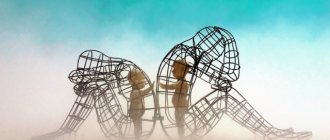Join our Telegram
Dysfunctional families are a breeding ground for the development of unhealthy behavior in children in the future. What factors could contribute to this?
Of course, genetics contribute to one scenario or another. There is increased aggressiveness, a tendency towards sociopathy and other congenital characteristics. However, despite the fact that most studies show their significant contribution to the formation of abusive or sacrificial behavior - from 35% to 50%, the family (or what replaces it) turns out to be the main institution shaping human behavior. That is, even with not the best inclinations, a healthy family is able to significantly correct potential destructive behavior.
In short, toxic parents are highly likely to produce toxic children and, subsequently, adults with abusive and sacrificial behavior.
At the same time, people with normal behavior, healthy self-esteem, capable of fulfilling relationships and joy in life can emerge from dysfunctional families. So, a toxic parental family is not a death sentence, but, nevertheless, a strong incentive for the development of toxic behavior in the future.
Definition of the concept
Abusive parents are people who periodically commit physical, psychological, financial or emotional violence against their own child. It may consist of ignoring his needs, manipulation, humiliation, screaming, causing physical harm and other manifestations.
Parental abuse can manifest itself in various forms:
- physical (assault, torture, corporal punishment);
- sexual (violent actions against a child, from which the parent receives satisfaction);
- emotional (psychological suppression of the child’s personality, manipulation, devaluation of his actions and achievements);
- ignoring the child’s needs (medical, physical, emotional).
Such a toxic attitude has a strong impact on the psyche and leaves its mark on the lives of older children. It is very difficult to get rid of all negative attitudes, work through this topic and regain adequate self-esteem. This is only possible with a strong desire and long-term therapy with a psychologist.
Abusive relationships: how to protect yourself
If there is an attack, then there must be protection from it. Any relationship with an abuser must be stopped as soon as possible, otherwise he may leave no stone unturned in the life of the victim.
To identify an abuser in the early stages of a relationship, you can compare his promises and how he fulfills them. Before starting a relationship, he can promise, as they say, a lot, but in the relationship itself he can seem to forget about his words. This should already raise suspicions.
Subsequently, the abuser begins his vile game: constant insults, whining, demanding excessive attention to himself. He may say that his partner does not love him, may be jealous for no reason, and constantly accuse him of something. In a relationship, the abuser can sometimes show intense passion, then suddenly move away, disappear for a while, and make you worry. All this is nothing more than manipulation.
How to get rid of it
:
- His words should be taken with skepticism. Don't believe everything he says.
- It is necessary to break off all relations with him: leave, turn off the phone, do not make contact under any pretext. In any case, it will be better than dragging out the relationship with him further.
- You need to turn to relatives and friends for support, it is also advisable to find a good psychologist.
- It is important to occupy yourself with something interesting, to learn to live freely.
Of course, an abuser will not abandon his failed victim so easily. he can pursue, follow around, insist on renewing the relationship. All his words must be answered with a strict and principled refusal, and all his actions towards you must also be strictly suppressed.
It is also important to protect yourself from future connections with abusers. A person must know his own worth. If, for example, a girl does not know how to value herself, then she will start a relationship with any suspicious person, just so as not to remain lonely; will marry a rich man and, in exchange for a prosperous life, will endure all humiliation and insults; will take pity on the “unfortunate” man, so that she can then carry him on her hump. Such a girl will almost certainly go to save her loved one - if he, for example, is a criminal, a gambler, a drug addict, etc. You shouldn’t do this, because in this case she shifts all the problems of an essentially worthless person onto herself person.
Causes of parental abuse
Victims of being raised by toxic parents believe that the reason for this behavior lies in themselves. They wonder: “What’s wrong with me?” They consider themselves bad and wrong children and are completely wrong.
The cause of abuse is the broken psyche of the parents themselves. It can be any personality disorder: narcissism, psychopathy, sociopathy, schizophrenia. Because of it, the parent is not able to adequately perceive the surrounding reality. What causes pain to a child is seen as love. And the victim’s attempts to hide or defend themselves look like a challenge to the abuser.
Most often, parents continue to use on their children the same parenting techniques that were used on them. It was then that their psyche began to change and led to a situation where the scenario was repeated.
It seems to them that children should a priori be obedient, so their own irritate and disappoint them with their incorrectness. At such moments, parents usually say to their children the phrases: “At your age, I was better, more obedient, more respectful of adults.” And behind these words lies not even regret, but envy of your child, because he should not be happier and freer than them.
Those who were victims of abuse as children are never fully able to grow up. Therefore, such a parent is not inclined to empathy and self-development, and therefore does not want to learn to use other parenting methods. He is not able to conduct a dialogue, give arguments for and against, because he is sure that only his opinion is correct.
The manifestation of infantilism is another typical feature of abusive parents. They are prone to resentment, shifting blame onto other people and being susceptible to other people's opinions.
What's the result?
As a result, children from such families, becoming adults, can live with destructive attitudes about themselves, about their role, about the role of loved ones, and in general a distorted view of the world. Reality is not their strong point.
What could it be? Here are just a few painful concepts that can shape both the position of the victim and abusive behavior, or both:
- I'm nothing
- Nobody needs me
- I'm offended by the whole world
- If not you, then you
- It's right that I suffer
- All people are scoundrels, so you need to be careful with them
- I'm helpless, I can't make decisions
- Anyone can betray at any time
- I do not know what I want
- There are rules in life and I make these rules.
- I'm not good enough. Always.
- Nobody loves me. Even if they love me, they still don't love me.
- I'm always abandoned
…And the list goes on
Signs of abusive parents
Abusive parents are presented as terrible tyrants with everything written all over their faces. But in most cases this is not the case. They love their children, but do not know that they can show their love in a different way without causing harm to the child’s psyche.
Such adults have at their disposal a whole range of the most sophisticated methods of influencing a child.
Physical abuse
Problems that can be solved with explanations, persuasion and persuasion are solved by toxic parents through physical actions. Spanking, slapping the head, pulling the arm is a less energy-consuming and more effective way to force a child to obey.
Rejection
This psychological method is also common among toxic parents. You can tell a child that if he does not obey, does not become what he should be, then he:
- they will be given to an orphanage, to the police, to strangers;
- they won’t take you to the theater, circus, or for a walk;
- will be replaced by someone else because he is not talented enough, smart enough, or even of the wrong gender, etc.
The child takes such phrases quite seriously, trusting the authority and correctness of the parent’s decisions. They hit self-esteem hard and make the idea that a child can be loved just like that seem mythical.
Ignoring
This method is used by parents who themselves experienced emotional cold in childhood. It is easier to frustrate and not notice the child’s desires and needs than to resolve complex issues and conflicts. In everyday life, an adult takes care of his child: feeds, clothes, treats, but does not show himself emotionally in any way: does not support, does not sympathize, does not strive to establish contact.
Overprotection
A controlling form of abuse: the parent is the only one who knows best what and how the child should do in childhood, and then in adulthood. For any violation and inconsistency, children must bear responsibility and punishment, and then obey the abuser even more so as not to make things worse.
Terrorization
This type of abuse is usually used by parents with a weakened psyche. They lash out at the child, express their anger, and then apologize and make amends. This causes an intrapersonal conflict for the victim, because it is impossible to guess when and why a kind and loving parent becomes a source of evil and a threat.
Blackmail
A common type of abuse because children easily believe everything their parents say. They can blackmail a child for any reason, even threatening suicide: “If you don’t answer calls, it means you don’t need a mother, you’ll be better off without me,” “Look at what you’re bringing me to.”
Gaslighting
Gaslighting is a special form of psychological abuse that has a strong impact on the child’s psyche. The parent does not allow the victim to formulate his point of view, but imposes what is convenient for him: “Stop crying, it doesn’t hurt at all,” “It seemed to you that nothing like that happened,” “So what if you promised to buy a toy, you didn’t get out?” in his room, so he’s not worthy of it.”
Insulation
Limitation in communication with peers has a serious impact on the child’s psyche and social skills. Many abusive parents forbid their children to go for walks, play with classmates and friends, or leave the house for any mistake. It may even go so far as to take the child out of school for home schooling just to limit his social contacts.
Corruption
This includes not only acts of a sexual nature, but also permission to do things that are not permissible for a child. Drinking alcohol, smoking, using drugs, watching pornography, as well as cruelty to people and animals - children should not have to deal with this.
Exploitation
Some parents believe that children can easily cope with the same responsibilities as adults. Therefore, they begin to involve them in housework, caring for younger brothers and sisters, and assign financial responsibility to them. This can be not only coercion and persuasion, but also an agreement with the promise of rewards.
A child's help can be considered normal only when the responsibilities are age-appropriate and performed on his own initiative.
Abusive and sacrificial behavior - the reality is more complex
Talking about people only with abusive and only sacrificial behavior is a big simplification. In reality, everything is much more complicated. Very often these roles are blurred, people jump from the position of abuser to the position of victim and vice versa. Sometimes people change over time and don't even notice it. For example, a victim who has left a relationship may decide that there will be no more abusive relationships in her life, then she herself, unnoticed by herself, can become an abuser, simply by changing one familiar role to another. An abuser seeking redemption is capable of embarking on a path of completely unimaginable sacrifice, actually losing his own life, losing himself.
What to do if parents are abusers
It is important to note that there is always only one abuser in the family - the mother or father. The second spouse, like the child, is subject to violence, and therefore is not able to act as a defender.
It’s even worse when the victim spouse tries to please the abuser and begins to imitate his attitude towards the children. The child has to endure double violence.
Therefore, the victim has two options for the development of events: life in submission or work on oneself and liberation. This will require a lot of effort, time and courage. An adult child must realize that his life is the main value, and he can dispose of it as he pleases.
Stages of a victim's life with abusive parents:
- The child is influenced by his parents and easily believes in their words and beliefs. This also applies to insults; children really begin to believe that they are bad, worthless, crooked, stupid, etc.
- The victim realizes the atmosphere in which he had to spend his childhood, understands how much time has passed in blind faith to his parents and what the betrayal on their part was. This usually happens in adulthood.
- An adult child frees himself from the thoughts and feelings imposed on him, is ready to break off communication with toxic parents and take responsibility for himself and his life.
Consequences of growing up in an abusive family
Growing up in families of toxic parents does not pass without leaving a trace; dependence on demands, reproaches and ambitions, and a critical attitude towards oneself can last a lifetime.
The most common consequences of such growing up:
- low self-esteem;
- lack of self-confidence and strength (lack of independence);
- negative self-perception;
- life in constant fear;
- self-blame for all failures (causes a lack of self-respect);
- feeling of helplessness and insignificance.
Having not received affection and care in childhood, a person comes to adulthood with the feeling that he is unworthy of love and the slightest sympathy. This leaves its mark on personal life. It either doesn’t work out at all, or it leads to the fact that the victim of abuse again falls under the influence of not the parent, but the partner.
If living with toxic parents has had such a strong impact on the psyche that a person is not ready to work through this topic, then he can repeat the scenario of abuse with his children.
Who do abusers choose as a victim?
Theoretically, anyone can fall into the network of an abuser. He does not always choose a weak, dependent and easily vulnerable person as a victim. Often the victim is a bright and strong personality.
Here are some common types of victims
:
- The object of everyone's envy
: a beautiful, successful person, happy, rich... The abuser seeks to destroy everything beautiful in this person. - Object of hatred
: this could be a person who is constantly laughed at or was laughed at as a child; he could have been rejected, his loved ones turned away from him, etc. In this case, it is easy for the abuser to find a reason for humiliation and offense. - A man with a strong character, who is not at all easy to figure out
. For a “professional” abuser, this is a reason to practice, improve their level, and therefore self-esteem. - A person who is satisfied with his life, living without worries and problems
. The abuser will certainly try to bring these problems to him. - Victim of another abuser
. It is also not difficult to catch such a person by convincing her that the new acquaintance is not at all the same as the previous tormentor. - A weak and deeply unhappy person
: a graduate of an orphanage, an orphan, someone who was left without a livelihood, etc.
There are categories of people who are at risk: single mothers, children from disadvantaged families, visitors, migrants, notorious people, public figures, famous personalities, rich and wealthy people who are strongly interested in personal relationships.
My recommendations
In childhood, a person is not yet able to understand that he has become a victim of an abuser. As an adult, it is not only possible to understand this, but also necessary in order to feel your independence and begin to live life to the fullest.
- Trust your feelings. If it seems that parents are stifling with their advice, care or prohibitions, then you should think about what is happening. Monitor your feelings by writing them down and analyzing them.
- Remember that it is not your fault that you were treated this way. But the choice of further actions and responsibility for your life is yours.
- Give yourself permission to be angry with your parents. You have every right to your emotions, and forgiveness should not become a suppression of feelings. Remember that anger can be not only negative, but also a good source of energy.
- Keep your distance from abusers and do not develop conflict if you do not have the strength to deal with it. To get out of a toxic relationship, any method is suitable, even a complete break with your parents.
- Constantly be interested in the topic of abuse, read sources, communicate with specialists. Analyze this information to develop awareness and look at the situation from the outside.
Dangers and Consequences
The danger is that children cannot escape violence if it comes from their parents. They can leave, severing all ties and completely stopping communication, only after reaching an age when they have already learned to independently provide for their needs and wants.
In the younger period there is nowhere to go, all that remains is to adapt and try to survive. Sometimes literally.
Children should receive love and care from mom and dad, but in reality this is not the case at all. Then their perception of both relationships and their own personality, values, outlook on life, etc. is distorted.
They lose their sense of security. Every person should have a place where he can relax and recover. Where he is calm and comfortable. Ideally, this is a home. When fighting for your place in society, and then when you get to your home fortress, it is important to take off your armor, heal your wounds, and rest.
If there is no such space, a person does not feel safe. He constantly experiences anxiety, as he expects an attack, a dirty trick. He loses trust in the world, and this already affects his relationships with people around him.
Unfortunately, not everyone is even able to distinguish when they are being violent and when they are not. Children who grow up in dysfunctional families are more likely to adopt their parenting style. Because they consider it quite acceptable.
What can we say about dysfunctional families, if it is socially approved to use a belt, cuffs, and intimidation as punishment.
Being in the role of a victim in childhood, a person often grows up and becomes prone to victimized behavior. She simply gets used to being in a relationship with a tyrant, gets used to suffering, and feels guilty for any sins. And he doesn’t know what to do and how to generally deal with a partner who, in fact, is not an abuser.
I am an abuser: how to help yourself
Yes, there are often people who admit that they are abusers. Some of them take their “disease” calmly, some even like it. And others feel that they suffer from their abuse and try to get rid of it.
Abuse is not a mental disorder, it is just a special personality type. It is possible to change such a personality, but only if she herself wants it. You can keep a diary. You can ward off “attacks” of abuse: every time the desire to annoy someone arises, you need to hammer a nail or mentally cut off your finger. It is necessary to control your behavior: learn to listen to your interlocutors, understand their point of view, respect their right to freedom, and not overstep the boundaries of personal space. It is also necessary to understand that there are no justifications for violence: they are all just hypocrisy, wishful thinking.
You should not be ashamed of the manifestation of human feelings. Any strong personality needs these feelings.











